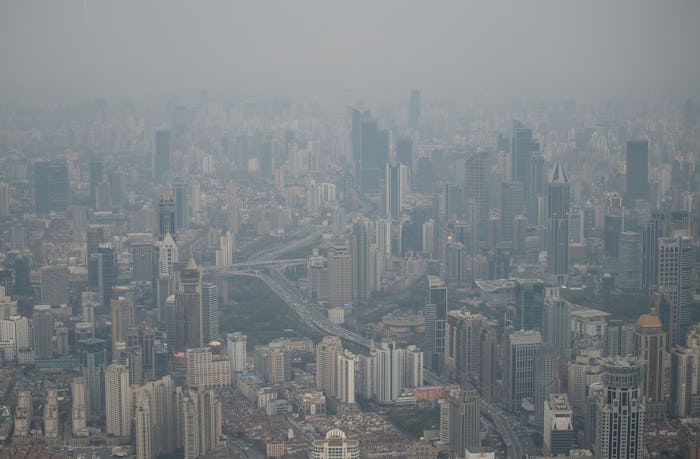Life

Air Pollution May Be Causing Babies To Age Faster, New Study Finds
There are probably very few people out there, if any, who think that air pollution is doing anything good for their health. But a new study shows that it may be way worse than previously recognized. In fact, air pollution may make babies age faster, and could lead to health issues later in life, researchers have found. So if anyone needs me, I'll be packing my bags and moving to the middle of a forest.
The new air pollution study was published in JAMA Pediatrics and conducted by an international group of researchers studying a group of mothers and newborns in Belgium. Researchers measured the length of telomeres in 641 newborn babies. For all those who have forgotten the finer points of what they learned in biology class, telomeres are the caps on the ends of chromosomes, as CNN explained, meant to protect those chromosomes from fraying or sticking together. Telomere lengths shorten each time a cell divides, until the length gets so short that the cell dies altogether. So basically, telomeres get shorter as people age. In fact, scientists have referred to telomere length as "a biological clock to determine the lifespan of a cell and an organism," according to the National Center for Biotechnology Information.
And researchers in this particular study found that babies born to mothers who lived in areas with higher air pollution while pregnant had significantly shorter telomeres than babies born to mothers in area with lower levels of pollution.
But, just how significant was the effect for babies exposed in utero to higher particle pollution from factors like car emissions and smog? As TIME reported, researchers found telomeres to be 8.8 percent shorter in those babies' cord blood cells, and 13.2 percent shorter in placenta cells. Among the test subjects, the researchers controlled for other factors like ethnicity, smoking habits of the mother, and more, and only tested full-term babies. It seemed that the second trimester was a particularly impactful and vulnerable time for babies to be exposed.
"Our results may have important health consequences later in life because a shorter [telomere length] at birth indicates less buffer capacity for postnatal influence of insults," the researchers concluded, according to TIME, adding decreasing air pollution "may promote longevity as from birth onwards and may enhance overall quality of life."
The researchers did make sure to note that their study had some limitations. They recruited their subjects from a relatively small area, rather than all over the world, and because they could not control every aspect of the situation, it's entirely possible that some other factors caused the phenomenon they noticed. They also estimated the air pollution exposure of the mothers based on their home address, rather than actually measuring it out individually. All in all, the researchers called for more scientists to look into the issue before any definitive conclusions could be reached.
Still, definitive or not, it's alarming for both parents and expectant parents. Obviously not every pregnant person can just pack up their lives and move to a tiny, smogless town, and drink water from a sparkling fresh mountain stream in order to ensure that their baby's telomeres are long enough to break world records.
But, if you're freaking out right now, there are ways that you can reduce air pollution, both on an individual level, and in a way that will hopefully impact society as a whole. You can take small steps like using energy-efficient appliances, and taking public transportation as much as possible. And, immediately, if you live in an area with a lot of pollution, you can try to stay indoors on days when the air is particularly bad.
And, of course, you can contact your representatives and try to fight for a less polluted world. It may be small, but it's something. After all, babies deserve better.
Watch Romper's new video series, Romper's Doula Diaries:
Check out the entire Romper's Doula Diaries series and other videos on Facebook and the Bustle app across Apple TV, Roku, and Amazon Fire TV.